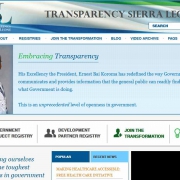Tanzania’s Bold ICT for Irrigation Strategy
Consistent with the view that the crafting and implementation of bold and strategic ICT policies is key for sustained agricultural development in the developing world, I have pointed out the need for improved policy frameworks in a range of countries. However, it is also important to commend those developing states that continue to make progress in this regard. Tanzania’s national e-government policy is one such example. This policy framework has enabled the Ministry of Water and Irrigation (MoWI) to develop a long-term ICT strategy, which includes using GIS, radio and cell phones, to deliver irrigation and water services.
The nascent strategy aims to achieve two pivotal things by 2014. First, it intends to help managers and engineers identify areas suitable for and in need of irrigation. The lack of reliable information and poor data collection processes has been a key challenge. To combat this, MoWI’s ICT strategy paves the way for the use of remote sensing and GIS technology to gather information on soil quality and available water resources. According to Daily News Online, Joash Nytambehead, head of the ICT unit at MoWI, says a system has been developed to capture data on all water points in the country. It involves visits to water points where GPS receivers are used to record and later collate coordinates. This is being complemented by efforts to map cellphone and internet connectivity, and access to traditional ICTs such as radio, across the east-African country.
Cellphones are currently being used by field officers to collect and instantaneously relay data on the condition of pumps and the types of crops being grown, which promises to strengthen the planning process. Managers will be better able to make use of GIS and field information to efficiently determine priority sites and the nature of irrigation systems that are needed. This is a major positive development because integrated water management is lacking in Sub-Saharan Africa, the region with the greatest dependence on rainfall, yet home to poor water management procedures and irrigation services.
The second and equally essential aim of Tanzania’s ICT strategy is that it should enable the state to efficiently inform the population about efforts to improve irrigation services. This is crucial because too often great projects flop when intended beneficiaries are left in the dark. The efforts to map mobile and internet connectivity, as well as, access to radio and other traditional ICTs, will allow the state to plot who may be target via the web, text massaging versus radio/TV programs and PSAs. This strategy is also expected to pave the way for streamlining services across offices and departments involved in the project.
While not a panacea, this policy position is a bold step in the right direction. The mix of ICTs that are being used to improve Tanzanian’s access to irrigation services is relevant and culturally appropriate.






































